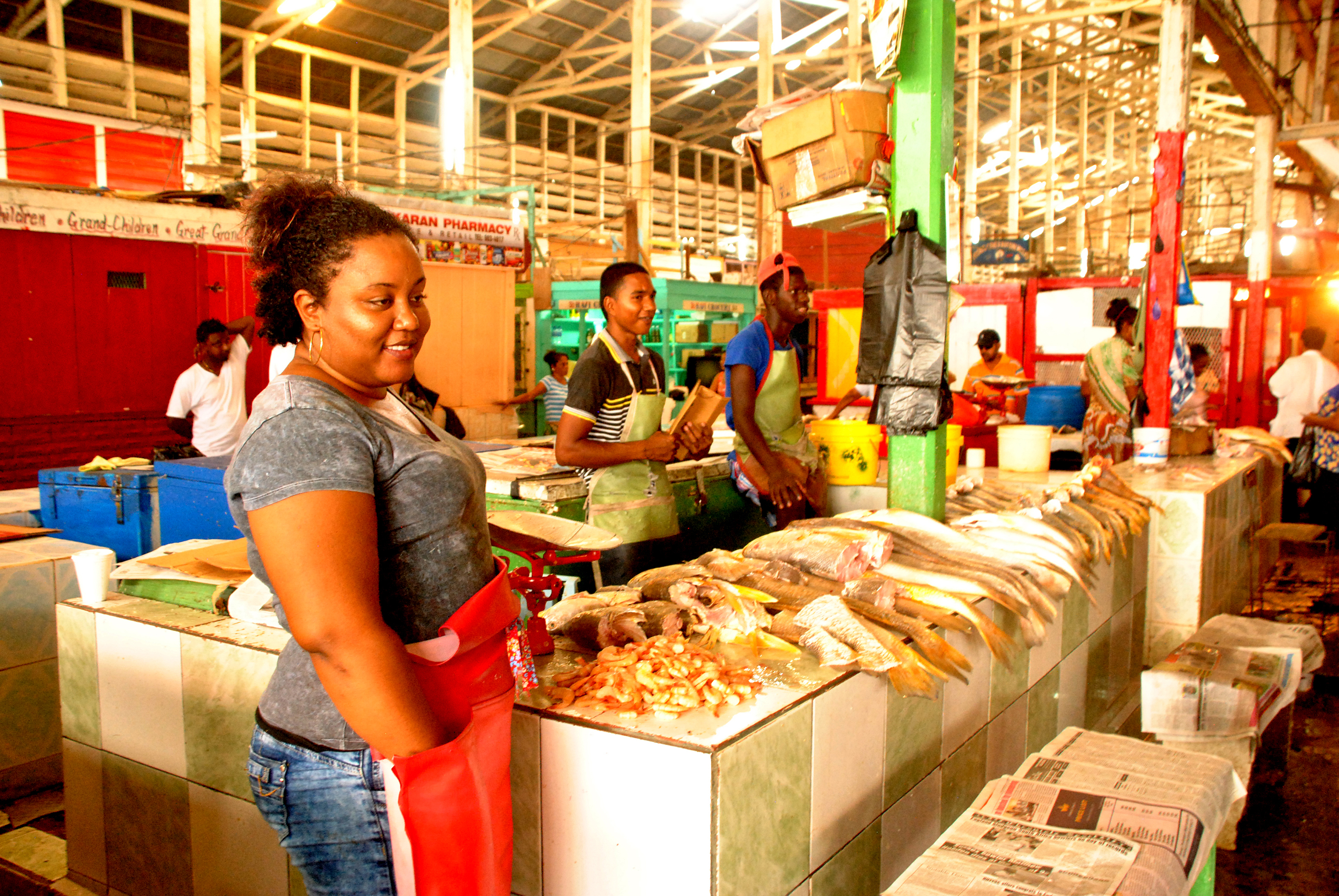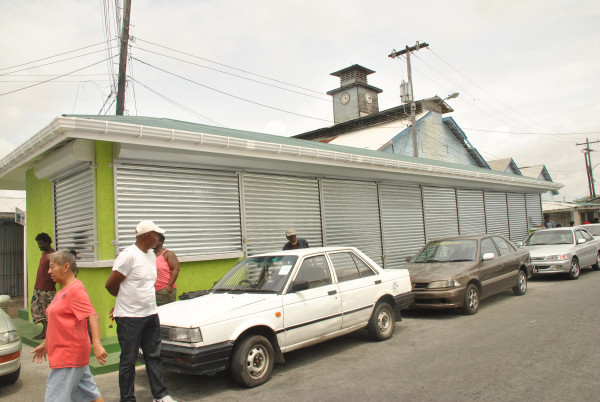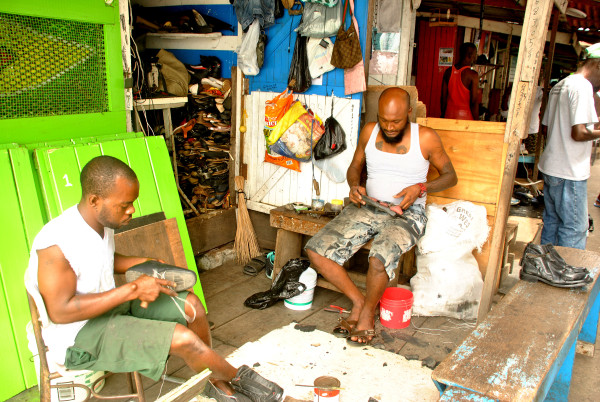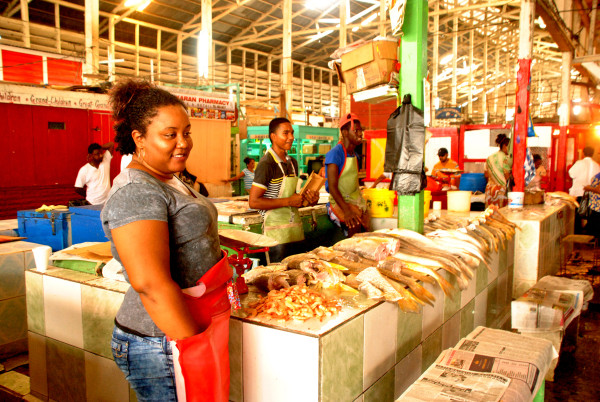How to positively transform the general ambience in and around the city’s municipal markets is not a question to which the Georgetown municipality has been able to provide a persuasive answer in years.
What the bureaucrats at City Hall seemingly fail to understand is that grand one-off initiatives attended by a generous measure of hype and hoopla are really no adequate substitute for a sustainable plan, which encompasses what it really takes to provide a holistic environmental transformation in Georgetown and its environs.
From the dismantling of the old Bedford school building to the changed logistical arrangements for trading on Merriman Mall, much of the transformation initiative undertaken by City Hall has been centred around Bourda Market and its environs. The consensus was that what obtained was untenable: vendors trading in the shadows of a derelict building probably on the verge of collapse; a filth-infested environment that simply could not come even close to being remedied by the relatively feeble interventions of the garbage disposal service; congestion; disorder and an un-mindfulness of proper garbage-disposal habits amongst the vendors; and nearby drains and canals clogged with the accumulated filth of trading that had become far too unmanageable for the wholly inadequate facilities assigned to keep the drains and canals clean.
Where cleanliness and good order are concerned, municipal markets will always pose a challenge and City Hall is not, even now, anywhere close to being up to the task. Resources for environmental management of our urban markets must be dedicated rather than periodically diverted. That is the only way that the intermittent crises will be averted.
The semblance of an enhanced sense of order and cleanliness that has been apparent in much of Georgetown in recent months has manifested itself in the Bourda Market area. While it would be churlish to ignore the efforts to raise environmental standards, it would be equally reckless to deny the reality that anything resembling a complete transformation will require far greater measures of time and resources.
On Sunday, Stabroek Business visited the Bourda Market to find out just how the vendors and shoppers were making out in their transformed environment. The vendors, particularly, appeared nonplussed, their dispositions appearing to make the point that City Hall had only finally undertaken a modest beginning of the task of making amends for the gross neglect that had been inflicted on them over the years. There is no lack of awareness of the change which the recent efforts of the municipality have brought about, but this is not the sort of thing, the vendors say, that warrants elaborate heaping of praise.
To get a sense of the disposition of the vendors, you have to talk to ‘veterans’ like 76-year-old Glycis Carter, whose 40 years of vending vegetables on Bourda ‘Green’ meant that she had grown used to the market environment. So even if she was not unaware of the transformation that City Hall was belatedly attempting, she appeared indifferent, preoccupied with the importance of Sunday sales and the particular role played by the takings from that day’s trading in the management of her home. She talked, briefly, about the past four decades that had been spent vending on the Green, raising five children in the process. Her uncomplicated take on the economy of vending is that “there are good days and bad days” and that over time you come to “accept and bless.” As far as the physical transformation is concerned she appeared unable to create a nexus between that and her own fortunes.
To be fair to City Hall, Bourda Market and its environs appeared somewhat different on Sunday. The areas housing the market and the ‘Green’ appeared cleaner than during the days of complete neglect. The vendors said the efforts of the municipality have encouraged them to do a bit more for themselves. They sweep their immediate trading areas, but the market continues to have to endure those testing periods when the city’s garbage disposal service disappears indiscreetly. Piled up garbage creates a sort of déjà vu that gives rise to talk about the municipality not really being serious.
On Sunday, the trading space on Merriman’s Mall, between East and Cummings streets was deserted. The emptiness of the space was a reflection of a falling out between the vendors who have traditionally traded between Orange Walk and East streets and a municipality which, apart from wanting to insist on higher environmental standards amongst the vendors, would appear to be inching towards a greater measure of cost-recovery for the services it claims will be on offer once the situation is regularized.
On Sunday, the half-done stalls on the former trading space were deserted. Some of the vendors who cannot trade there—at least for the time being—were inconveniently located in various corners around the market area. They are brooding, some expressing feelings of having been betrayed by a municipality whom, they say, is beginning to talk the language of entrepreneurship to a group of vendors who have been struggling to make a meaningful living for much of their lives.
Vendors like Desrey Dey and Della Weeks are among those who have had to endure a nomadic experience ever since City Hall begun to flex its muscles some months ago in what it said was an effort to bring a sense of order to the market area. Dey used to trade from a spot on Bourda Street close to what used to be the Bedford Methodist School. She moved to allow for the demolition, but has since returned to her original spot. For her, it is a matter of being closer to the consumers.
Weeks is a ground provision vendor. For some months now she has been displaced from her accustomed trading space on Merriman Mall. The council is currently upgrading the area. The problem is that the level of trust between City Hall and the vendors is strictly limited. Weeks is not the only vendor who is growing increasingly anxious about the length of time it is taking to complete the renovation and repairs to stalls. What bothers vendors like Weeks too, is what this newspaper understands will be a hike in stall rents from the prevailing $300 to $1,500 per day, once the vending area is upgraded. Among the vendors there is a line of argument which says that where the extent of patronage fails to keep pace with the hike in stall rents some of them will have to give up their spots altogether. There is also talk of reduced vending time.
Amongst the vendors there appeared to be ‘full house’ at Bourda on Sunday. It is still, for obvious reasons, a favoured trading day. Weekdays are working days and on Sundays you avoid (though it is questionable whether or not this is still the case) the Saturday ‘crush.’ Other things are changing too. Car acquisitions have increased significantly in recent years as a consequence of which both traffic and parking in the vicinity of Bourda Market have become issues, even on Sundays. At the height of trading last Sunday cars were moving east along Church Street at a snail’s pace, a sight that used to be seen only at peak hours on weekdays.
The demand for parking has other implications. The vendors say that, often, the waste disposal vehicles must compete with private cars for parking space, a situation which, from time to time, compromises the garbage disposal operation.
Almost every vendor adds an entirely different dimension to the dynamics of Sunday trading at Bourda. The three or four cobblers with whom Stabroek Business spoke said that these days they mostly have to wait on customers. Up to when we engaged him around mid-morning on Sunday Joseph Osborne had not taken in a single job for the day. Another cobbler, Floyd Charles gestured at a stall packed with shoes that had been rendered some time ago but remained to be collected.
The cobblers are located in an area of Bourda Street, extremely close to the drain that borders Bourda market to the west. The vile smell that emanates from the drain raises questions as to just how thorough a job of ‘cleaning up’ the trading area is being done. Junkies live cheek by jowl with the stench and the garbage and the cobblers say that City Hall appears indifferent to this particular problem.
On Sunday too you could see the vendors grappling with the frustration of unloading their goods, inching their vehicles as close as possible to the unloading point. In more ways than one parking has become a nightmare. The bottom line, frankly, is that like everywhere else in an overcrowded capital, space is at a premium. Even now, it is probably dawning on the Georgetown municipality that its efforts at a capital ‘make over’ may well be stuck between a rock and a hard place.










